Interview
15-minute fundamentals with Arbitrum

In 15-minute fundamentals, we break down the business of a crypto project and learn about the drivers behind the data you can see on Token Terminal's charts.
In this episode A.J. Warner, Chief Strategy Officer at Offchain Labs, the team behind Arbitrum – a Layer 2 smart contract platform for decentralized applications on Ethereum – joined us for an episode to discuss the basics of Arbitrum, how it works, the scaling solution market, what makes Arbitrum unique, current growth drivers and challenges, economic model, plans for the future, and more.
Arbitrum's dashboard: https://tokenterminal.com/terminal/projects/arbitrum
Timestamps:
00:00 Introduction & what is Arbitrum
04:12 The scaling solution market & how Arbitrum is positioned within it
08:30 Arbitrum Nova and its use-cases
10:10 How is Nova different from a typical sidechain?
13:12 Arbitrum One’s smart contract infrastructure
17:56 Arbitrum’s economic model
18:46 The team behind Arbitrum
20:37 The drivers behind recent momentum
21:58 Flipping Ethereum in daily transaction count
22:39 Network throughput and capacity
24:38 Challenges to tackle
25:05 What’s next for Arbitrum?
The authors of this content, or members, affiliates, or stakeholders of Token Terminal may be participating or are invested in protocols or tokens mentioned herein. The foregoing statement acts as a disclosure of potential conflicts of interest and is not a recommendation to purchase or invest in any token or participate in any protocol. Token Terminal does not recommend any particular course of action in relation to any token or protocol. The content herein is meant purely for educational and informational purposes only, and should not be relied upon as financial, investment, legal, tax or any other professional or other advice. None of the content and information herein is presented to induce or to attempt to induce any reader or other person to buy, sell or hold any token or participate in any protocol or enter into, or offer to enter into, any agreement for or with a view to buying or selling any token or participating in any protocol. Statements made herein (including statements of opinion, if any) are wholly generic and not tailored to take into account the personal needs and unique circumstances of any reader or any other person. Readers are strongly urged to exercise caution and have regard to their own personal needs and circumstances before making any decision to buy or sell any token or participate in any protocol. Observations and views expressed herein may be changed by Token Terminal at any time without notice. Token Terminal accepts no liability whatsoever for any losses or liabilities arising from the use of or reliance on any of this content.
Stay in the loop
Join our mailing list to get the latest insights!
Continue reading
- Changelog #003

Changelog #003
This week, the team has been hard at work shipping updates to our Bloomberg Terminal app, fixing bugs, and plenty of background work on data migrations and more!
- Uniswap’s Multichain Expansion Is Ethereum-Aligned

Uniswap’s Multichain Expansion Is Ethereum-Aligned
This week’s newsletter visualizes Uniswap’s growth and expansion from a single-chain to a multichain DEX. We go through Uniswap’s key financial and usage metrics, and break down the aggregate figures by chain. The chain-level datasets on Token Terminal offer valuable depth to the analysis of individual projects.
- Asset Tokenization, the Return of the Incumbents?

Asset Tokenization, the Return of the Incumbents?
This week’s newsletter focuses on asset tokenization and the impact it could end up having on the crypto markets. We explore (i) how asset tokenization works, (ii) why incumbent companies might have an edge in leveraging blockchains, and (iii) what’s actually happening onchain today.